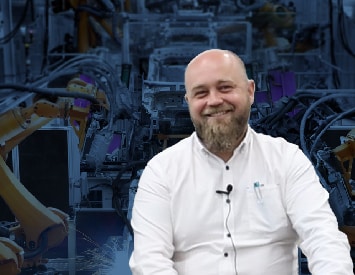EIT student David Humphries chats with us about successfully balancing work and family life while pursuing a bachelor’s degree in industrial automation at the Engineering Institute of Technology (EIT).
EIT Student David Humphries: Life, Work, and Industrial Automation
David Humphries, an interface lead at Metro Trains in Melbourne, Australia, shares his unique journey juggling professional responsibilities, familial duties, and academic pursuits. His quest for a 100 percent online degree led him to EIT, where structured lectures and interactive tutorials fostered a vibrant student community essential for success amidst a demanding schedule.
In a rapidly evolving industrial landscape, David sheds light on emerging trends like automated safety systems in transportation and underscores the importance of structured time management. In this interview, David offers invaluable lessons on Bachelor of Science (Industrial Automation Engineering).

Tell us a bit about yourself and how you found out about EIT?
I’m an interface lead at Metro Trains, I’m studying automation engineering and I’m an electrician. I wanted to do a degree and I wanted it to be 100% online. All the universities in Victoria were partially in person, so this was how I found EIT. I needed a 100 percent online option because I have two wonderful kids and a very demanding job that requires a lot of hours. This is why I enrolled.
What was the learning experience at EIT like?
The lectures are solid; you watch them prior to your tutorials. During tutorials, it’s like having another lecturer revisiting the same or similar subject matter. You’re in a chat room with other students, which allows for interaction. It was beneficial. In the beginning, we set up WhatsApp groups among students to discuss questions, help each other out, which really fosters a sense of community and makes you feel like a student.
Can you discuss a recent industry trend in industrial automation that’s impacted your work?
The only industry trend that I have seen at work is the roll out of many automated safety and passenger handling systems. I would not say that it has ‘impacted my work’ just that there is additional scope required in rail communication to enable automated systems to communicate.
What tips do you have about balancing work, home life, and study?
To manage the demands of work, my personal business, family, and study I live a fairly structured life when class is in session, setting aside two hours per evening and usually all of my Saturdays. If I do not complete my work by the end of Saturdays, then studies flow into my Sundays. It helps a huge amount that I have a devoted wife who does everything she can to enable the time I need to make this successful.
Reflecting on your time at EIT, could you highlight a memorable project or experience that influenced your career?
I found that Prof. Dharmit Thakore’s class on ‘Engineering drawing and CAD’ to be thoroughly enjoyable but not for the reasons one might imagine. One of my hobbies is 3D printing, and this class gave me the tools I required to design my own parts. Not relevant to my work or my plans for work but I came out of that class with a new skillset that I now use regularly and enjoy using.
Watch David’s full video interview here:
For current students, what advice would you offer to excel in industrial automation engineering?
If I were to give advice to current students, it would be that hard work wins the day over intelligence or natural ability. Fail to take heed of the course study duration recommendations and overall time commitments and you will likely fail. Do the work, regardless of ability, and you will likely succeed. I would also add that getting a private tutor the moment you find yourself struggling is essential as the pacing of university course is brutal and you will not have time to catch up on your own.
What challenges do you anticipate for engineers in industrial automation, and how do you navigate them?
The challenges I see for most industrial engineers is largely that designs and calculations are largely done offshore, which drives down the market for talent in Australia. This means that unless you can build a reputation as an authority in the industry, the normal postgrad engineer will likely take a very long time to get a decent salary.
This in effect will drive out manyof the very talented people for greener pastures (like construction) which further compounds the problem. How I beat the race is by going around it. I was never a project engineer, I was first an electrician, then leading hand, now project manager. With this skillset I have been able to spin up my knowledge levels whilst being paid a living wage right from the outset.
Envisioning the future, how do you see industrial automation shaping transportation and infrastructure?
Victorian rail is mid transition to a more automated future. There are many engineers required to make this happen and probably many required to service and maintain these systems. It is possible that the train drivers will eventually be replaced, but I doubt it will happen in my lifetime. In the meantime, I feel that various levels of automation can contribute to safety and efficiency but only if they are implemented well.
I am not sure if we are on that track (pun intended). Many of the systems I see rolled out across Victoria (not just rail) are poorly thought out, lacking in a business case and generally poorly executed. This I attribute to the low wages that the industry offers as well as a general appetite for the public to ‘automate everything’ regardless of its actual utility.